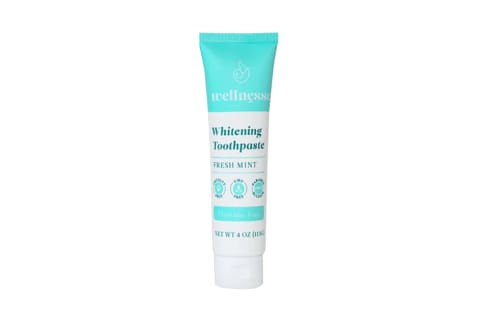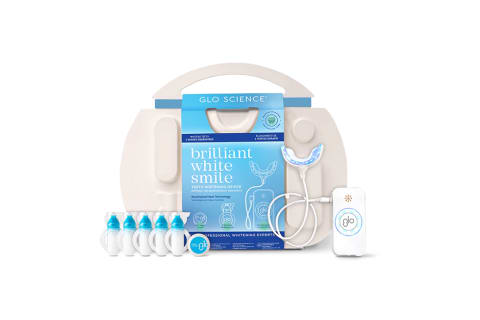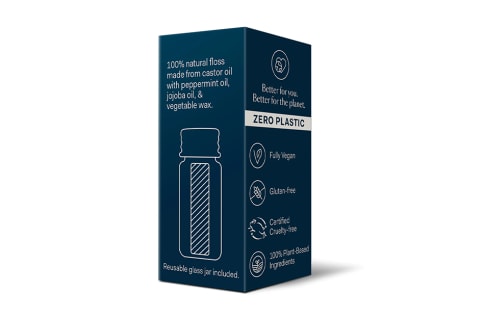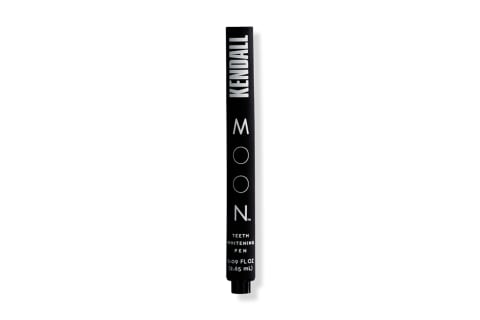Long story short: Oral care isn’t something to play around with. When it comes to teeth whitening, the same is true. We asked dentists to give us the 101 on teeth whitening to help you navigate this buzzy topic without damaging your teeth. Here’s what to do and what not to do, straight from experts. “Coffee, tea, red wine, sodas, and tobacco use are the most common culprits for yellowing teeth,” dentist and founder of Walden Dental David Frank, DMD, tells mbg. But if you skip a basic oral care routine—including brushing, flossing, and possibly a mouthwash, there’s no way your teeth will stay perfectly white. Other possible factors contributing to teeth discoloration include aging, genetics, and oral trauma, dentist and founder of oral care brand GLO Science Jonathan B. Levine, DMD, tells mbg. In addition, some medications can cause tooth discoloration. “Antihistamines, antipsychotics, and blood pressure medications can cause dry mouth, which can lead to tooth decay and yellowing of the teeth,” Levine says. These factors can be harder to spot and control, so meet with your dentist if you think any of the above may apply to you. Regardless, start with the habits you can control. Once you’ve evaluated what might be causing your teeth to yellow in the first place, do your best to either moderate or eliminate the habit if possible. If you’re concerned about coffee (this one’s arguably the most common), consider opting for a reusable straw to ensure the coffee doesn’t touch your front teeth, or carry a travel-friendly toothbrush with you for a quick cleaning post-coffee. While oil pulling hasn’t been studied in terms of teeth whitening treatment, anecdotal evidence does support the possibility. Plus, the overarching benefits for your oral health are worth adding the practice to your routine. “Oil pulling may be beneficial for reducing the volume of bacteria in the mouth and thus improving gum health and preventing oral health issues like decay, bad breath, and gum disease,” Levine explains. While bacteria may not be all bad all the time, studies show they can lead to the yellowing of the teeth1 when out of balance. More specifically, a bacteria called Streptococcus mutants has been known to cause plaque and gingivitis. Luckily, swishing coconut oil in your mouth daily was shown to reduce this bacteria1, research shows. So if your tooth discoloration is caused by a buildup of bacteria, then oil pulling might be a good option to try. Regardless, it’s one low-lift (and affordable) oral care habit to add to your routine. Plus, hydrogen peroxide toothpaste has been studied, with promising results. In this study, toothpaste with a higher concentration of hydrogen peroxide was deemed more effective for whitening teeth2 than the less potent paste. However, you’ll want to be sure to avoid anything stronger than 3% hydrogen peroxide, as more intense concentrations can result in tissue damage around the gums3, research shows. What’s more, don’t use hydrogen peroxide whitening treatments too often. “It is generally recommended to use hydrogen peroxide for teeth whitening no more than once or twice per week and get a consultation from your oral health professionals,” Levine says. To use baking soda on the teeth, mix a small amount—no more than a tablespoon—with a bit of water in a small bowl to create a paste. Then, brush your teeth with the DIY paste. Or, you can look for toothpaste with baking soda in the formula. The effectiveness of this method depends on how severe tooth stains and discoloration are. Some people may see results after just a few uses, while others might need to keep this practice in rotation for a bit longer. You can even opt for low-lift whitening pens that make teeth whitening as speedy as can be—here are 6 of the best options on the market, all backed by dentists. If you have access to a dentist, meeting with them for a consultation for in-office treatments is also one option that’s worth an investment. At the consultation, your dentist can develop a game plan specifically designed to whiten your teeth and address any sensitivities. “The enamel layer protects the tooth and is the hardest substance in the human body and can be broken down with acids,” he adds. So any sort of fruit juice or acidic rinse is a no-go—period. To manage bacteria in the mouth, opt for oil pulling instead. If you’re tempted to scrape your teeth because you feel plaque buildup, visit your dentist for proper teeth cleaning with professional-grade tools.






